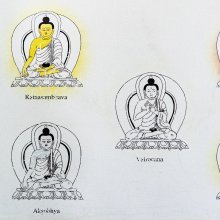Haritavarna, Haritavarṇa, Harita-varna: 2 definitions
Introduction:
Haritavarna means something in Hinduism, Sanskrit. If you want to know the exact meaning, history, etymology or English translation of this term then check out the descriptions on this page. Add your comment or reference to a book if you want to contribute to this summary article.
Images (photo gallery)
In Hinduism
Ayurveda (science of life)
Source: gurumukhi.ru: Ayurveda glossary of termsHaritavarṇa (हरितवर्ण):—[haritavarṇaṃ] Green colour

Āyurveda (आयुर्वेद, ayurveda) is a branch of Indian science dealing with medicine, herbalism, taxology, anatomy, surgery, alchemy and related topics. Traditional practice of Āyurveda in ancient India dates back to at least the first millenium BC. Literature is commonly written in Sanskrit using various poetic metres.
Jyotisha (astronomy and astrology)
Source: Wisdom Library: Brihat Samhita by VarahamihiraHaritavarṇa (हरितवर्ण) or simply Harita refers to the “green colour” (of the disc of Jupiter), according to the Bṛhatsaṃhitā (chapter 8), an encyclopedic Sanskrit work written by Varāhamihira mainly focusing on the science of ancient Indian astronomy astronomy (Jyotiṣa).—Accordingly, “If the disc of Jupiter should appear of the colour of fire, there will be fear from fire; if yellow, there will be disease in the land; if dark-blue, there will be wars; if green [i.e., haritavarṇa—analavarṇe ... harite], suffering from thieves, and if of blood color, suffering from weapons. If the disc of Jupiter should appear of the colour of smoke, there will be drought; if it should be visible during day, rulers will perish and if it should appear large and clear at night, mankind will be happy”.

Jyotisha (ज्योतिष, jyotiṣa or jyotish) refers to ‘astronomy’ or “Vedic astrology” and represents the fifth of the six Vedangas (additional sciences to be studied along with the Vedas). Jyotisha concerns itself with the study and prediction of the movements of celestial bodies, in order to calculate the auspicious time for rituals and ceremonies.
See also (Relevant definitions)
Relevant text
Search found 2 books and stories containing Haritavarna, Harita-varna, Harita-varṇa, Haritavarṇa; (plurals include: Haritavarnas, varnas, varṇas, Haritavarṇas). You can also click to the full overview containing English textual excerpts. Below are direct links for the most relevant articles:
Rig Veda (translation and commentary) (by H. H. Wilson)
Atharvaveda and Charaka Samhita (by Laxmi Maji)
Vanaspati (Plants) used in Veda < [Chapter 2 - The nature of treatment for diseases in the Ancient era]
